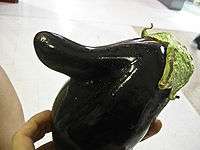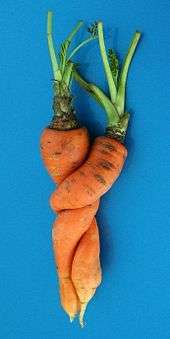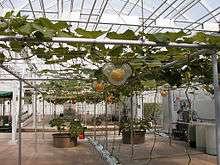Unusually shaped vegetable

An unusually shaped vegetable is a vegetable or fruit that has grown into a shape not in line with its normal body plan. While some examples are just oddly shaped, others are heralded for their amusing appearance, often because they resemble a body part such as the buttocks or genitalia. Pareidolia can be common in vegetables, with some people reporting the appearance of religious imagery.
Causes

Vegetables usually grow into an unusual shape due to environmental conditions. Damage to one part of the vegetable can cause the growth to slow in that area while the rest grows at the normal rate. When a root vegetable is growing and the tip is damaged, it can sometimes split, forming multiple roots attached at one point. If a plant is in the primordium (embryonic development) stage, damage to the growing vegetable can cause more extreme mutations.[1]

The unusual shape can also be forced upon the vegetable. In Japan, farmers of the Zentsuji region found a way to grow cubic watermelons by growing the fruits in glass boxes and letting them naturally assume the shape of the receptacle. The square shape supposedly makes the melons easier to stack and store, but the cubic watermelons are often more than double the price of normal ones.[2] Using similar techniques, growers have also created more complex shapes of watermelon, including dice, pyramids, and faces.[3]
If carrots are grown in soil which has been manured that year, some of the carrots are strange shapes because the young carrot plant's roots go off in odd directions, drawn by irregular pockets of manured soil.
Legislation
In the European Union, recent attempts to introduce legislation prohibiting the sale of misshapen fruit and vegetables were defeated. The proposed "uniform standardisation parameters" would have applied to straight bananas and curved cucumbers, as well as to more extreme cases such as carrots with multiple "legs", or fused fruit. The main concern for opponents of the proposed legislation was the ethical question of the wastage it would have generated if growers were forced to discard up to 20% of their crop, produce that was nutritionally identical to more regularly shaped specimens. [4]
Competitions
It is common in some countries to celebrate the diversity of vegetable shapes, with particularly unusual items being entered into competitions. Many of these are judged by the ugliness of the vegetable.[5] Some organisations run contests in which gardeners enter the largest vegetables that they have grown, with pumpkins being particular favourites.[6]
In popular culture
The popular BBC television programme That's Life! mixed investigative journalism with more lighthearted sections, which included items on unusually shaped vegetables.[7]
The BBC comedy television programme Blackadder contains several jokes relating to the character Baldrick and his obsession with odd-shaped turnips. The most notable example occurs in the episode "Beer", in which Baldrick discovers a turnip shaped like a phallus, giving rise to several jokes throughout the episode.
Ben Elton's novel This Other Eden is set in a future in which most aspects of life are controlled to conformity, meaning the loss of 'amusingly shaped vegetables', much to the protagonist's annoyance.
Gallery
-

"Twin" zucchini
-
A strawberry "man"
-
An unusually shaped cherry
See also
References
- ↑ Plant Answers. "Why are some of my vegetables growing into such odd and unusual shapes?". Retrieved 5 June 2007.
- ↑ BBC News. 15 June 2001. "Square fruit stuns Japanese shoppers". Retrieved 5 June 2007.
- ↑ PingMag. 12 July 2007. "Funny Shaped Japanese Watermelons". Retrieved 13 July 2007.
- ↑ "Wonky fruit to stay on sale in EU". BBC News. 25 March 2010.
- ↑ Cornwall County Council. 16 September 2005. "Giant Vegetable Competition and Show at Kehelland Horticultural Centre". Retrieved 22 October 2010.
- ↑ Cheung, Maxine. The Toronto Observer. "Stouffville grower squashes the competition at the Royal Winter Fair". Retrieved 5 June 2007.
- ↑ "Rantzen's years in the limelight". BBC. 16 June 2006. Retrieved 29 August 2013.
External links
- Love Carrots and Other Vegetables - "A sporadic photographic journal of weird or humorous vegetables".
- The Mutato Collection - "A collection of non-standard fruits, roots and vegetables".
- MoFa-Museum of Food Anomalies - "An online exhibition of the Art of Regular Food Gone Horribly Wrong."
- - "Attempt at EU-wide 'wonky fruit and veg' ban fails."